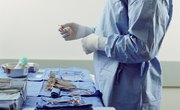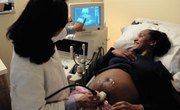Neonatologists take care of some of the most fragile -- and the most adorable -- patients: premature babies. They also work with babies with special needs, such as those born with low birth weight or birth defects. To provide the best care for this precious population, neonatologists have to complete many years of training, including medical school, residency and a fellowship. They can start their training by choosing the right classes in high school to be successful in college and get into a top medical school.
Biological Sciences
Students will complete many courses in the biological sciences in their education to become a neonatologist. According to information from the St. John's University website, a typical pre-med curriculum includes one year of general biology with labs, and then medical school training may include course work in biology, microbiology, cellular biology and immunobiology. Taking high school courses in the biological sciences can help students establish a foundation to help them succeed at the college level. Mastery of biology will help neonatologists understand the processes in the body that may be causing poor health or disease.
Anatomy and Physiology
Closely related to the study of the biological sciences, anatomy focuses on the study of the body, including its organs, tissues, bones and major systems. Students who begin their study of anatomy and physiology in high school can prepare themselves for greater success in college and medical school. This knowledge will be critical to the work of a neonatologist in understanding how the body works, how diseases and poor health conditions can manifest, and how to treat them. Early preparation can lead to mastery of the material.
Study of Chemistry
Chemistry is another cornerstone of a medical education and the training required for neonatologists. St. John's University says that the typical pre-med curriculum includes one year of general chemistry with a lab, one year of organic chemistry with a lab and one year of biochemistry with a lab. Knowledge of chemistry helps neonatologists understand how prescription medications and other therapies affect the treatment of disease and other poor health conditions. Students can begin their education with a basic chemistry course in high school and any advanced chemistry courses that may be offered.
Advanced Math
Advanced-level mathematics such as calculus and statistics are intertwined with scientific research. St. John's University says that a typical pre-med curriculum requires at least one course in either calculus or statistics. Both courses are offered in most high schools, and some schools may even offer Advanced Placement Calculus AB, Advanced Placement Calculus BC, and Advanced Placement Statistics. Students who take these courses can position themselves for success in undergraduate and medical school and then apply that knowledge to their practice in neonatology.
Related Articles
References
Writer Bio
Maria Magher has been working as a professional writer since 2001. She has worked as an ESL teacher, a freshman composition teacher and an education reporter, writing for regional newspapers and online publications. She has written about parenting for Pampers and other websites. She has a Master's degree in English and creative writing.











